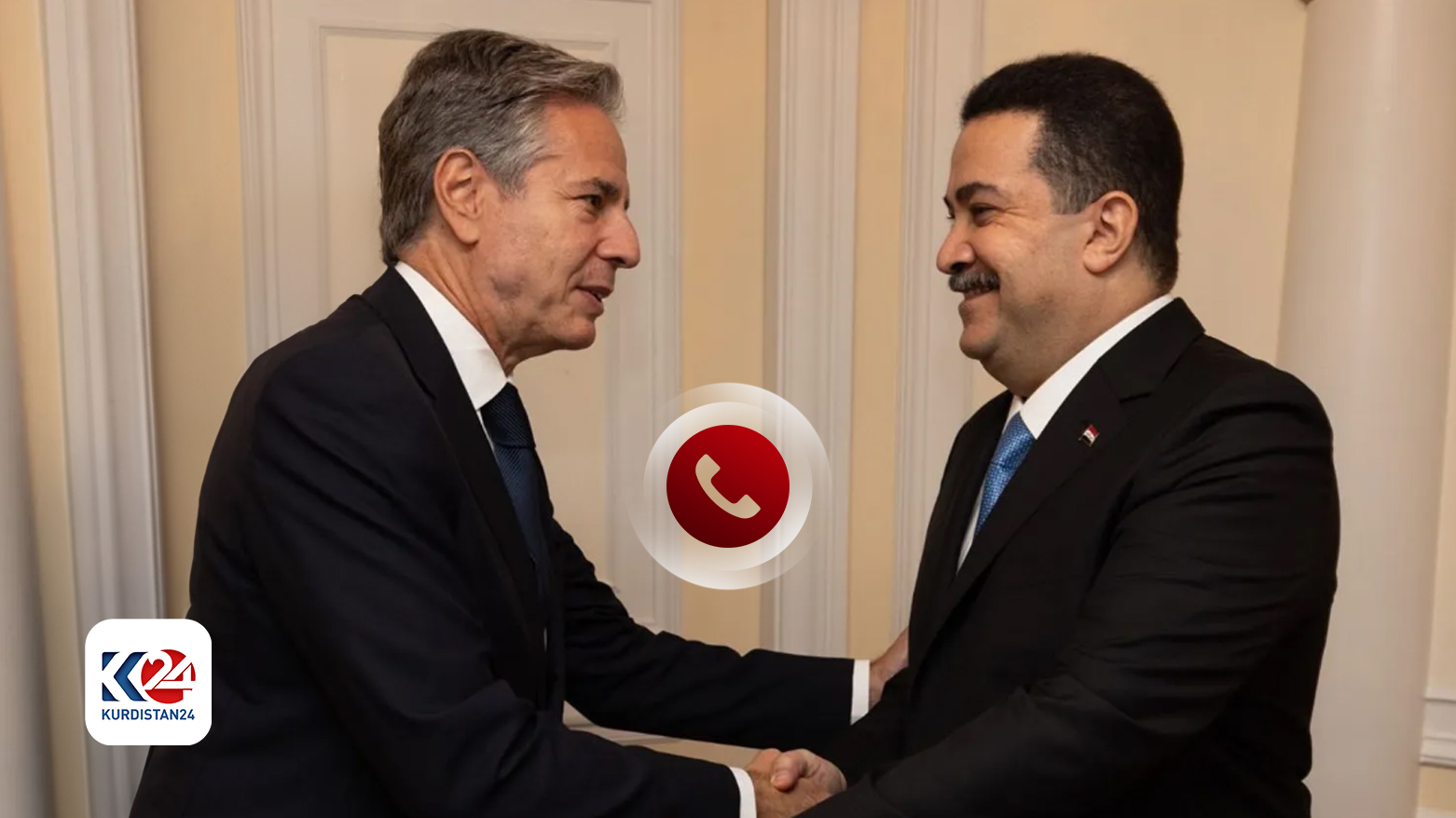Blinken Tells Sudani: Baghdad Needs to Control Militias; Prevent Attacks from Iraqi Territory
It’s important that Iraq not be drawn into regional conflict, Blinken said, and stressed “the need for Iraq to exert control over armed groups launching unauthorized attacks from its territory.”

WASHINGTON DC, United States (Kurdistan 24) U.S. Secretary of State Antony Blinken has spoken with Iraqi Prime Minister Mohammed Shi’a al-Sudani, according to a read-out of their discussion released on Tuesday by State Department Spokesperson Matthew Miller.
Miller’s read-out reflected the relatively cordial relations between Washington and Baghdad that have followed Sudani’s visit to the U.S. in April, as the head of a large Iraqi delegation.
Read More: U.S. Seeks to Broaden Ties with Iraq, as PM Sudani Makes First Visit to Washington
However, the discussion between Blinken and Sudani, which took place on Monday, also reflected U,S. concerns that Iraq could be drawn into the ongoing conflict between Iran and its proxies on the one hand, and Israel on the other.
The Iraqi government has not succeeded in establishing control over the Iranian-backed militias, which style themselves “the Islamic Resistance in Iraq (IRI),” although Baghdad would like to do that.
There are just two groups involved: Kata’ib Hizbollah and Harakat Hizbollah al-Nujaba. They are firing regularly at Israel, and they risk provoking Israeli retaliation on Iraq.
Indeed, as Abdul Amir Thuaiban, an adviser to Prime Minister Sudani, stated, “Those groups who have the rockets and the drones should go to Gaza and Lebanon to fight Israel, rather than pushing Iraq towards destruction.”
Read More: Washington to Baghdad: We’ll Help Prevent Israeli Attack in Retaliation for Militia Strikes
It is unclear what either group represents. Most likely, they operate at Iranian direction.
Blinken-Sudani Discussion
In their discussion, Blinken “called on the Iraqi government to fulfill its commitments to protect U.S. personnel in Iraq and Syria, including from attacks by Iran-aligned militias,” according to Miller’s read-out of their conversation.
“The Secretary emphasized,” the read-out continued, “it is important that Iraq not be drawn into regional conflict and underscored the need for Iraq to exert control over armed groups launching unauthorized attacks from its territory.”
Their conversation also included other aspects of the Middle East conflict. That includes “ongoing efforts to end the war in Gaza and secure the release of all hostages,” Miller’s read-out explained.
“They also discussed diplomatic efforts to reach a resolution in Lebanon that ensures citizens on both sides of the Blue Line [the Israeli-Lebanese border] can return to their homes,” it continued.
And it concluded, “The Secretary and Prime Minister committed to continued consultations on regional issues and to advance the U.S.-Iraq strategic partnership.”
Context: Multiple Reports that Iran will Attack Israel from Iraq
Israel and Iran have been involved in repeated military exchanges since April, when Israel attacked the Iranian consulate in Syria. Most recently, on Oct. 26, Israel struck Iran in response to an Oct. 1 Iranian attack on Israel.
The Biden administration had strongly urged Israel to keep its attack limited in the hope that would keep Iran from responding.
Israel did that, limiting itself to striking Iranian military targets. At first, it seemed that Tehran would refrain from further action. However, on Thursday, two senior Iranian officials made strong statements indicating there would be an Iranian counter-attack, and on Saturday, Ayatollah Ali Khamenei threatened “a tooth-breaking response.”
On Sunday, The Wall Street Journal, one of America’s top newspapers, reported that in conversations with Arab officials, Iranian officials had promised a “strong and complex” response, according to one Egyptian official.
The missiles that Iran uses in its next attack would have more powerful warheads than those used in its last assault on Israel, the Iranian officials said. In addition, they stated that “Iran could use Iraqi territory for part of the operation,” the Journal explained.
Reporting from Israel a few days earlier, the news magazine, Axios, reported that Israeli intelligence expected that the attack would be “carried out from Iraq using a large number of drones and ballistic missiles.”
That is the background to Monday’s conversation between Blinken and Sudani.
Kurdish Warnings
For some months, the Kurdish leadership has been warning about Iranian attempts to drag Iraq into the conflict with Israel.
In July, the long-time Kurdish leader, Masoud Barzani, now head of the Kurdistan Democratic Party (KDP), made a rare visit to Baghdad—his first in six years—and that was one of his key messages.
Read More: US Envoy Lauds Meeting with Masoud Barzani
More recently, Hoshyar Zebari, who spent many years in the Kurdish opposition to Saddam Hussein and became Iraq’s first foreign minister after his overthrow, has warned that the Iranian-backed militias, particularly al-Nujaba and Kata’ib Hizbollah, seek to drag Iraq into that war. Both groups are supported by the Qods Force of Iran’s Islamic Revolutionary Guard Corps, and the U.S. has designated both as terrorist groups.
As Zebari explained in a post to X last month, the two groups are operating contrary to the wishes of almost every Iraqi politician—including Prime Minister Sudani and even the Coordination Framework, the pro-Iranian alliance of Iraq’s Shi’ite parties.
اصرار بعض الفصائل لاقحام العراق في الحرب الإقليمية القادمة لا سيما النجباء و كتائب حزب الله و بالضد من ارادة حكومة السوداني و البرلمان و الاطار التنسيقي في إعلان حالة الحرب او السلم كقرار سيادي عراقي انما يعرضون امن و سلامة العراق إلى خطر محدق و الخاسر الأكبر سيكون الشعب العراقي…
— Hoshyar Zebari (@HoshyarZebari) October 19, 2024
U.S. intelligence anticipated that Iran’s retaliatory attack on Israel would come after the U.S. elections, because Tehran did not want to help Donald Trump, who would likely benefit from such an assault.
Now that the elections are over and, it appears, Trump has won, it does seem that if Tehran intends to carry out such an attack, the best occasion, from an Iranian perspective, would be sometime before Trump takes office in January.